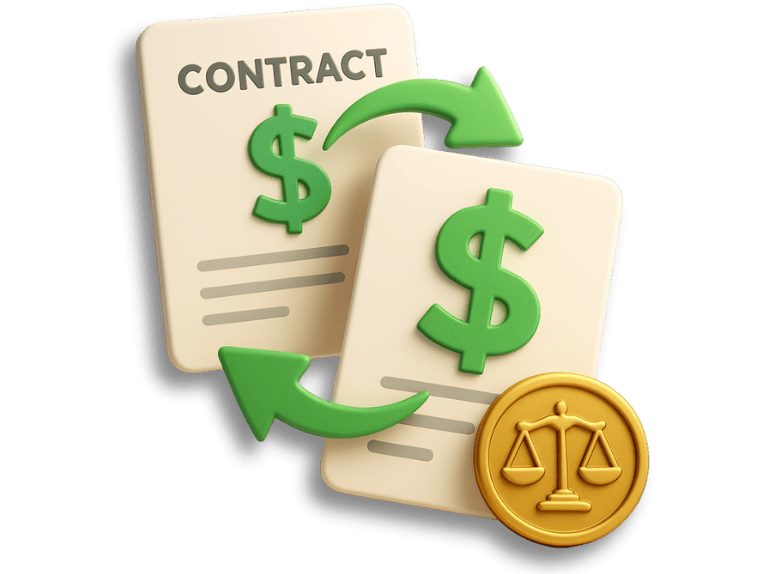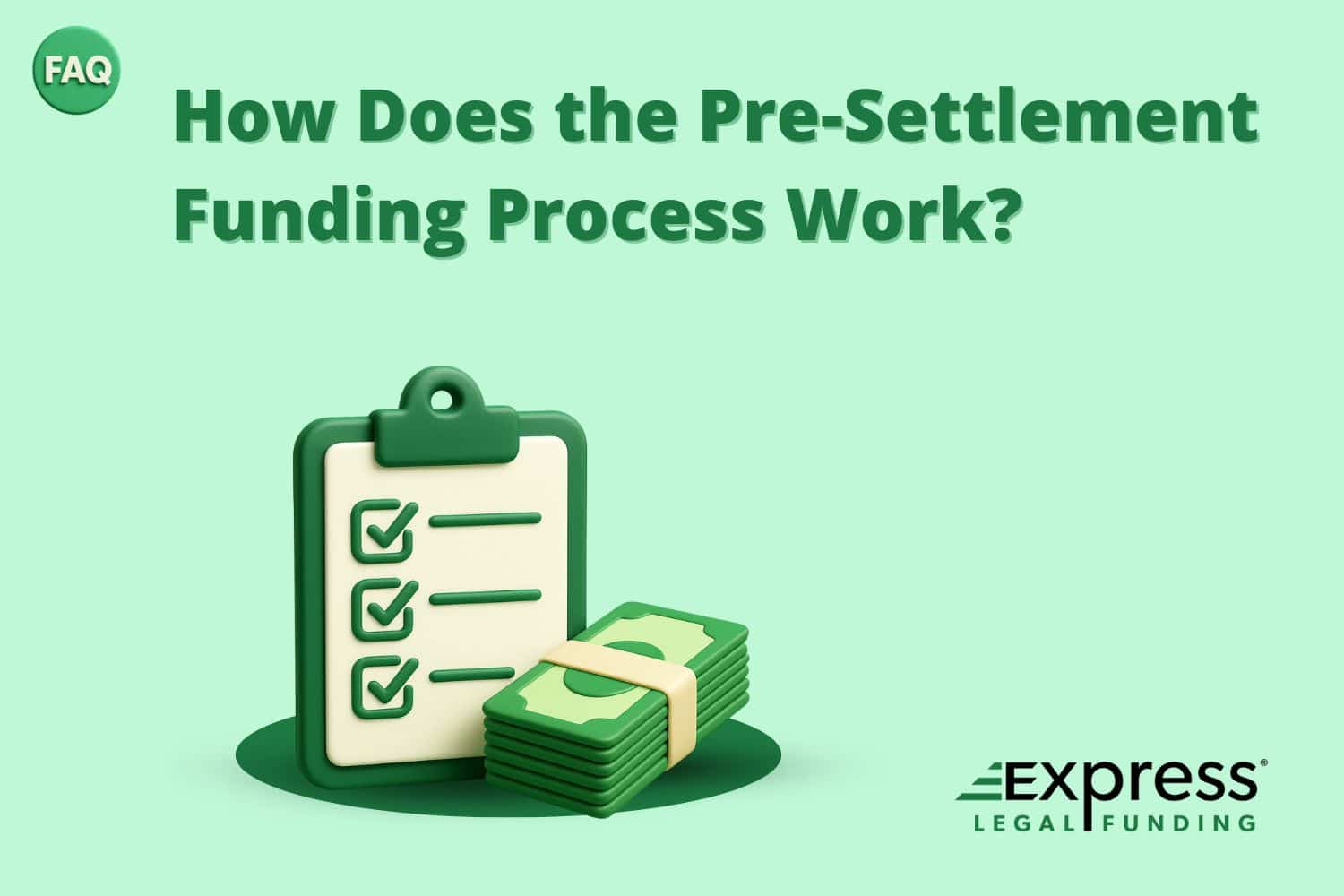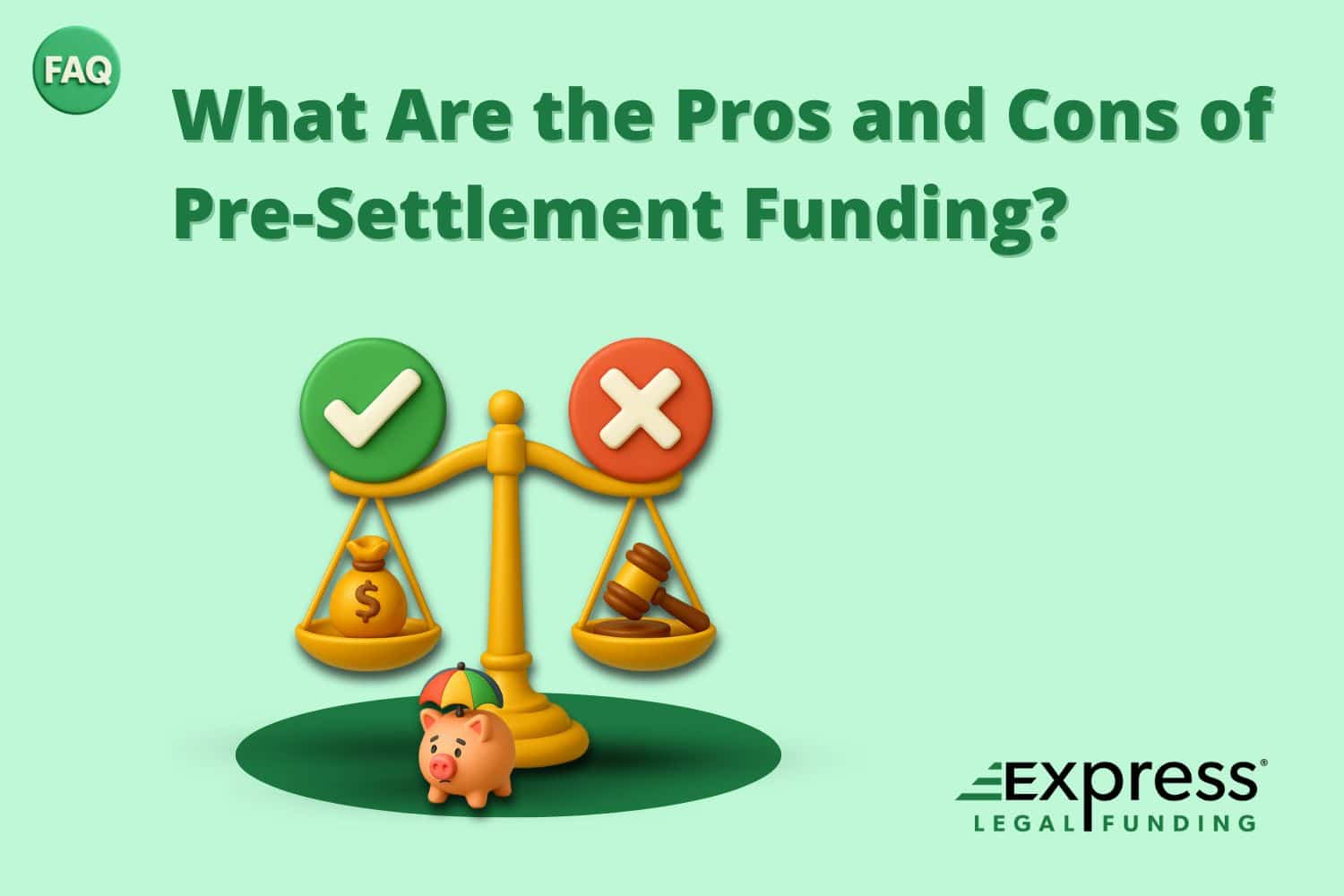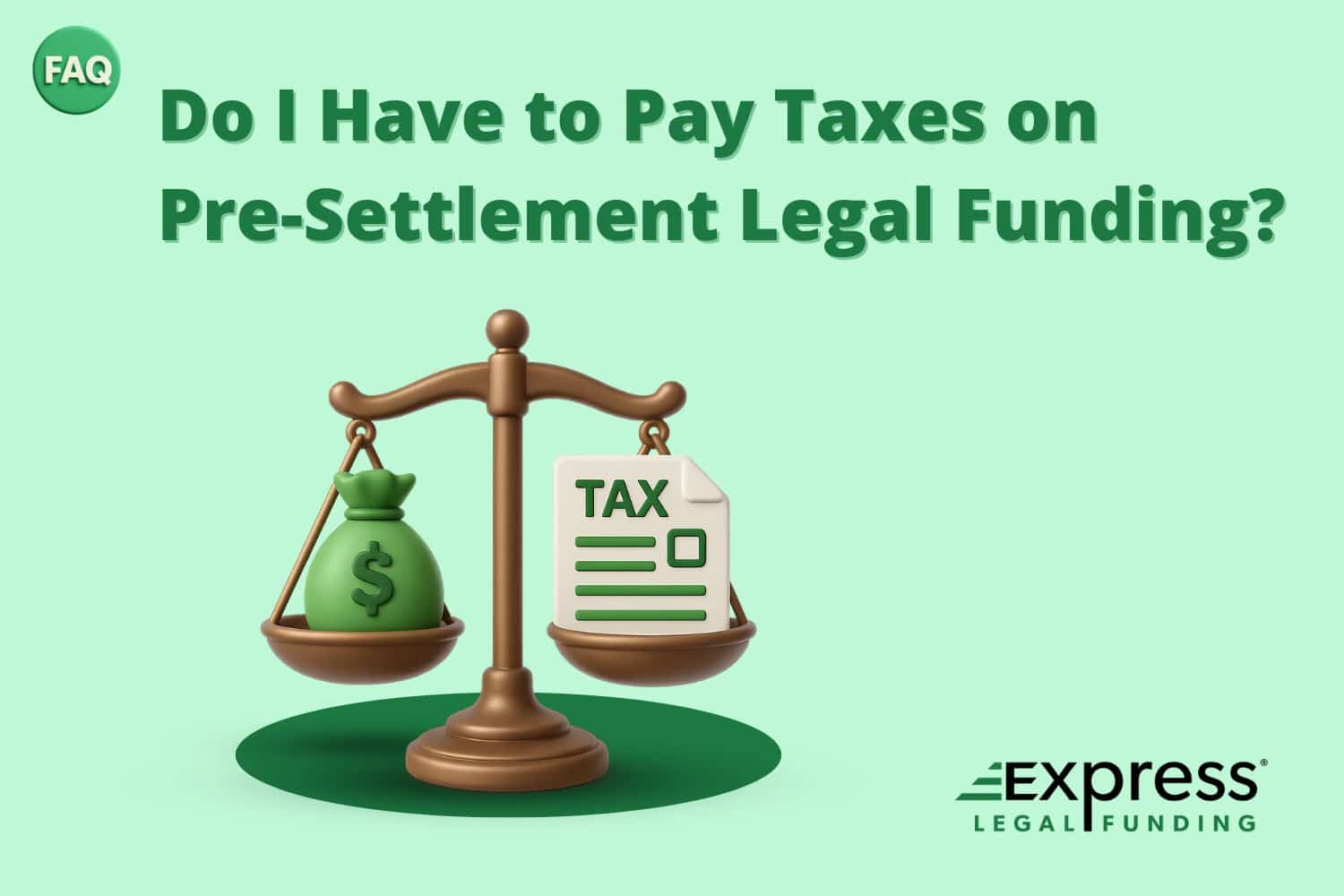When plaintiffs need more money during a lawsuit or feel stuck in an expensive contract, a pre-settlement funding buyout can help. In a buyout, a new legal funding company steps in, pays off your original advance, and provides you with a new agreement that almost always comes with additional funds.
This approach can give you immediate financial relief, simplify repayment by replacing your old lien, and potentially save money if the new terms are more favorable. Importantly, your case itself remains unaffected — your attorney still manages the lawsuit, and repayment is only required if you win or settle.
Understanding how buyouts work is key to making an informed financial decision.
How Does a Pre-Settlement Funding Buyout Work?
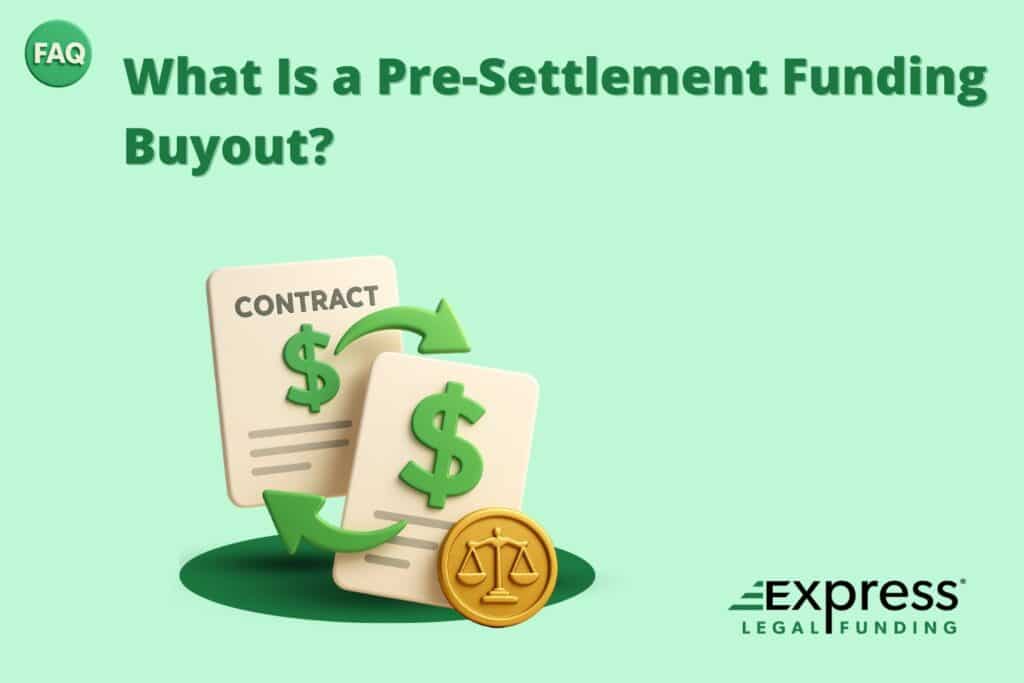
The buyout process is fairly straightforward, but it requires coordination between your attorney, your current funder, and the new funding company. Here’s the usual order of steps:
- Step 1: Apply with a new funding company.
You begin by submitting an application for additional pre-settlement funding. Since you already have an advance, the request will automatically involve a buyout. - Step 2: Payoff letter requested.
The new funder contacts your current funding company and asks for a payoff letter. This document shows the exact balance owed on your existing lien. - Step 3: Case review and approval.
While waiting for the payoff letter, the new company reviews your case details (liability, damages, insurance, and attorney cooperation). Once the payoff is confirmed, underwriters decide how much additional funding can be safely advanced. - Step 4: New contract issued.
If approved, the new funding company prepares a contract that includes paying off your old funder directly. Almost always, this contract comes with additional funds, meaning you get more money upfront beyond the payoff. - Step 5: Attorney consent and lien transfer.
Your attorney reviews and signs an acknowledgement of your additional funding, confirming that the old lien will be paid off and properly replaced by the new lien. Only then is the buyout finalized and funds disbursed.
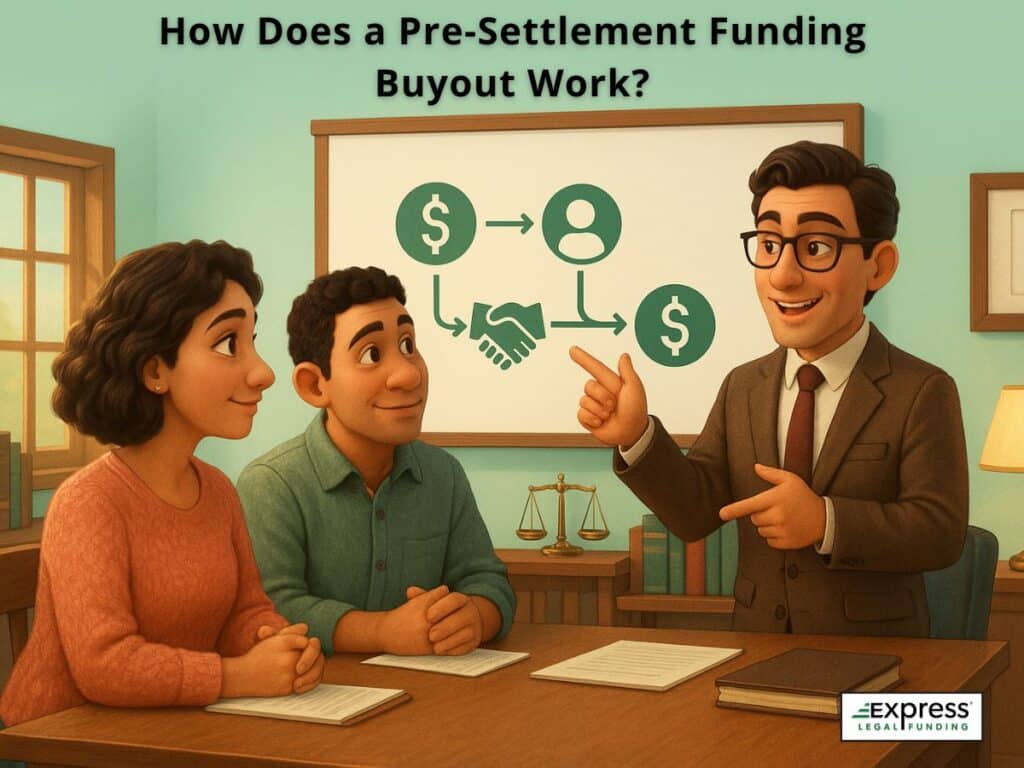
Pre-Settlement Funding Buyout Timeline: How Long Does the Process Take?
Most buyouts finish within just a few business days. Here’s how the process usually unfolds:
- Day 1–2: The plaintiff applies with a new funding company. At the same time, the new funder requests a payoff letter from the current company to confirm the balance owed and reaches out to the attorney for case details.
- Day 2: Underwriters review the case (liability, damages, insurance coverage, and attorney cooperation) along with the payoff balance to decide if more funding is possible.
- Day 2–3: If approved, the new funding contract is sent. The plaintiff and attorney review and sign the agreement, which includes the payoff of the old lien.
- Day 3: The new company pays off the prior funder and disburses the additional funds directly to the plaintiff, completing the buyout.
Most buyouts take 3–5 business days to complete, but delays happen if the prior funder is slow to send a payoff letter.
Example Pre-Settlement Funding Buyout Scenario
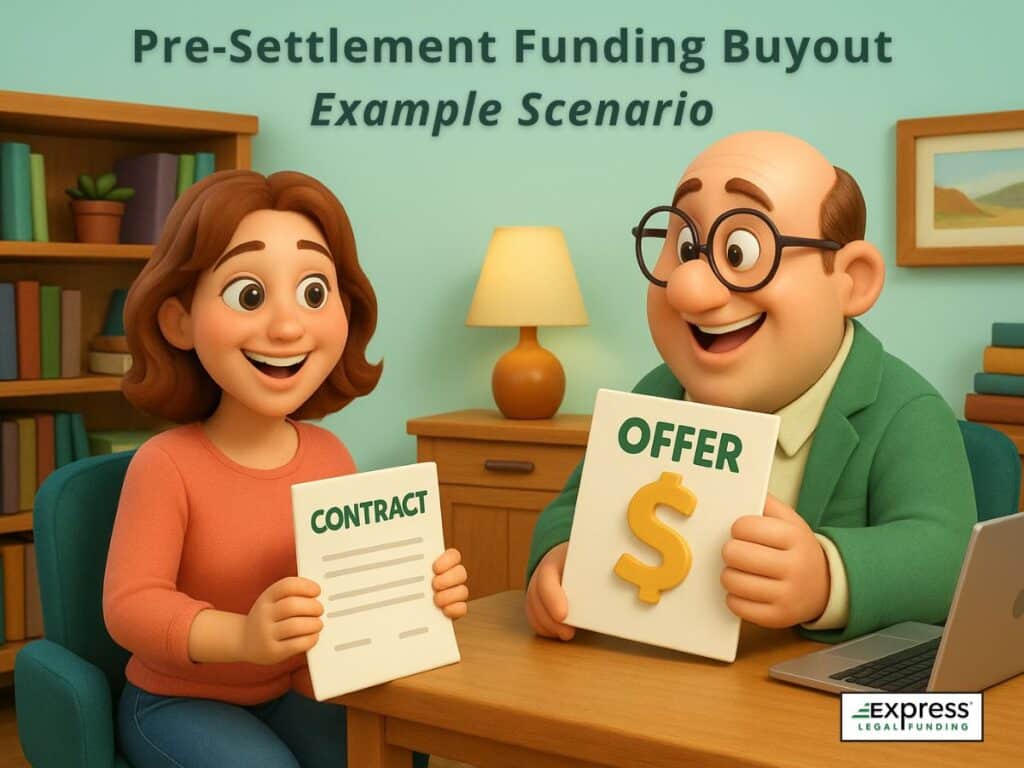
Sarah, a personal injury plaintiff, first received a $10,000 settlement advance from her original funder. Over time, fees increased her payoff balance to $12,500. A new company steps in and offers a buyout: they pay off the $12,500 owed, create a new $17,500 contract, and give Sarah an extra $5,000 in cash right away.
Her old lien is cleared, and she now has one simple agreement with better terms. This shows how a buyout can help plaintiffs lower costs, combine old funding into one contract, and still get the extra money they need while waiting for their case to settle.
Cost Comparisons: Buyout vs. Original Pre-Settlement Funding
Buyouts include more money, but they also come with a trade-off. By refinancing, the new advance is written on top of the old payoff, which means plaintiffs are now paying interest on the original funding plus its built-up fees. In this way, buyouts can have a compounding effect.
Still, savings are possible when the new agreement has lower fees or simpler terms. For example, if Funder 1 charges a $30 administrative fee every six months, that adds $60 more in costs if the case lasts another year. If Funder 2 does not charge those fees, the plaintiff saves that $60 immediately — on top of the benefit of getting more money upfront.
In short, a buyout can still lower lawsuit funding costs if the new funder has clearer terms and avoids unnecessary fees.
Underwriting Differences Between Initial Pre-Settlement Funding and Buyouts
When plaintiffs first apply for pre-settlement funding, underwriting focuses on the basics of the case. The funding company reviews liability (who was at fault), damages (injuries and losses), available insurance coverage, and whether the attorney will cooperate. From this, they decide if the plaintiff qualifies and how much can be safely advanced.
In a lawsuit loan buyout, underwriting adds extra steps. The new company still reviews the case, but also looks at the balance owed on the current funding contract. They request a payoff letter showing how much is due. From there, they calculate how much additional funding can be offered without going over a safe share of the expected settlement.
Other factors also matter. Pre-settlement funding underwriters consider policy limits on the defendant’s insurance, any medical liens that must be repaid, and the attorney’s contingent fee (usually 33–40% of the settlement). If the payoff already equals too much of the projected recovery — often around 20% or more — the plaintiff may not qualify for extra funds.
In short, initial underwriting asks if the case is strong enough to fund. Buyout underwriting checks both case strength and existing liens, along with insurance coverage and expenses, to see if more money can be advanced responsibly.
When Underwriters Decide a Buyout May Not Make Sense
Not every case is a good fit for a buyout. Underwriters may decline — or plaintiffs should think twice — if:
- High payoff balance: The amount owed is already 20% or more of the expected settlement.
- Low case value: Limited damages make the lawsuit too small for another advance.
- Large medical liens: Hospital or treatment bills must be repaid, leaving little room for funding.
- Limited insurance coverage: The defendant’s policy may not provide enough money to cover liens and new advances.
- Near settlement: If the case is close to resolving, there may not be enough time to benefit from the buyout.
Why Would Someone Consider a Pre-Settlement Funding Buyout?
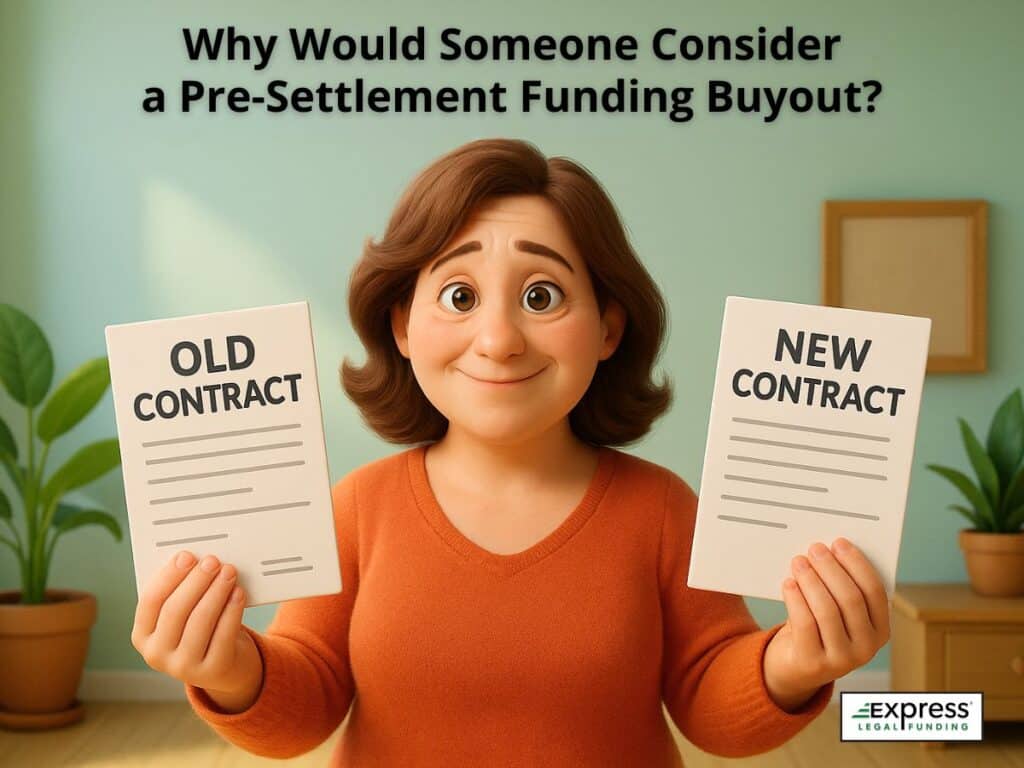
Plaintiffs often turn to a pre-settlement funding buyout when their current advance is no longer working in their favor. A buyout replaces the old advance with a new contract that usually has lower costs and includes more cash upfront. Common reasons include:
- High Costs of Current Advance
Many first-time advances carry high-interest lawsuit loans or compounding fees that cause the balance to grow quickly. A buyout can lower overall lawsuit funding costs. - Better Terms from a New Company
By switching funding companies, plaintiffs can move into simpler contracts that may reduce how much they owe when the case settles. - Need for More Money
If expenses have grown, a buyout allows plaintiffs to refinance a pre-settlement loan and receive additional funds beyond the payoff. - Transparency and Trust Issues
Some companies are not clear about their terms. A buyout lets plaintiffs replace confusing agreements with a more transparent contract.
Example: John took a $7,000 advance with compounding fees, and his balance grew quickly. By getting a buyout, he lowered his future costs and received an extra $3,000 right away.
Helpful read: How to Choose a Trustworthy Legal Funding Company?
Pros and Cons of a Pre-Settlement Funding Buyout
A pre-settlement funding buyout can be very helpful, but it also has limits. Plaintiffs should look at both the advantages and drawbacks before moving forward.
Pros
- Plaintiffs almost always receive additional funds, which means more money for bills and living expenses.
- Switching to a new company can lower overall costs and reduce what is owed at settlement.
- A buyout replaces multiple liens with one agreement, making repayment simpler.
- Clearer contracts can help plaintiffs avoid high-interest lawsuit loans and confusing terms.
Cons
- Not every case qualifies, especially smaller lawsuits with limited value.
- Buyout contracts charge interest on prior interest and fees, creating a compounding effect.
- Some buyouts include small administrative or lien transfer fees.
- State laws may restrict or ban buyouts in certain situations.
Relevant read: What Are the Pros and Cons of Pre-Settlement Funding?
How Does a Buyout Affect Your Case and Court Settlement?
A pre-settlement funding buyout does not change how your lawsuit is argued in court, but it does change the financial side of your case.
- Attorney’s Role: Every buyout requires your lawyer’s approval. They review the payoff amount, sign off on the new contract, and make sure funds will be distributed properly when the case resolves. Without this step, the buyout cannot move forward.
- Lien Replacement: Once the new funder pays your old company, that lien is satisfied and replaced with a new one. Only one lien remains on your case, which prevents disputes or multiple claims at settlement.
- Settlement Distribution: Courts and attorneys follow a set order when dividing settlement money. First, the attorney’s contingent fee (often 33–40%) and statutory medical liens (like Medicaid or state-funded hospital bills) are paid. Next, the funding lien is repaid based on the new contract. Whatever remains goes to the plaintiff.
In short, a buyout simplifies liens, keeps your attorney in control, and ensures courts can distribute the settlement smoothly and fairly.
State Rules Requiring Buyouts of Pre-Settlement Funding Contracts
Not all states treat pre-settlement funding buyouts the same way. In some places, like Missouri and Illinois, the law requires that a new funding company pay off the prior lien before advancing more money. This protects both plaintiffs and the courts from confusion about who should be repaid first.
There is one exception: if both funding companies agree in writing, the new company can provide funding without first buying out the old lien. Without this written agreement, a buyout is mandatory.
For plaintiffs, this means:
- You usually can’t stack multiple legal funding liens in states like Missouri and Illinois.
- A new advance will almost always come through a buyout, which clears the old lien.
- Your attorney will need to confirm the lien replacement or written agreement before the new funds are released.
These rules are designed to simplify settlement distribution, reduce disputes between funders, and make sure plaintiffs receive a fair share of their recovery.
Relevant read: How Many Pre-Settlement Loans Can You Get?
Why Legal Funding Companies Buy Out Prior Pre-Settlement Advances
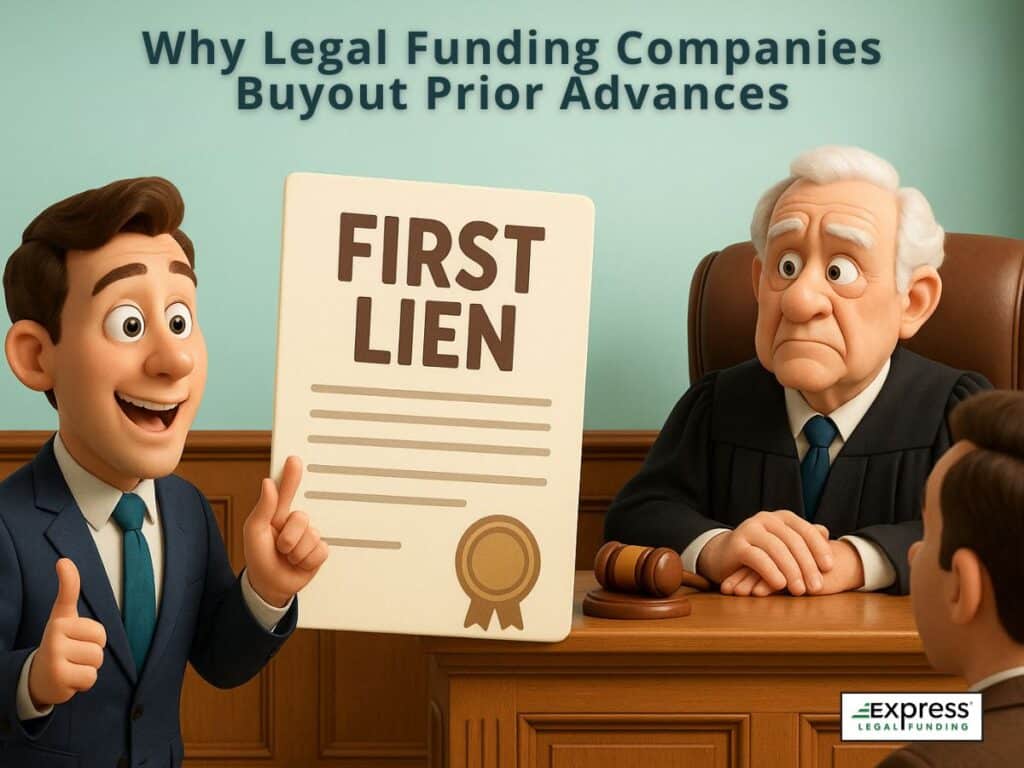
Legal funding companies often offer buyouts so they can take the first lien position on a case. First lien means they are first in line to be paid back from the settlement before any other funding companies.
Courts and attorneys always consider lien priority when dividing settlement money. An attorney’s contingent fee and required medical liens (like Medicaid or state-funded hospital bills) are paid first. After that, funding liens are repaid. If more than one funder has a lien, it can create disputes and reduce how much the plaintiff takes home.
A buyout helps solve this. The new funder pays off the old one and becomes the only lienholder. This clears up confusion, reassures the court that liens are in order, and usually gives the plaintiff additional funds under one simpler contract.
In short, companies buy out prior lawsuit cash advances to protect their repayment rights and to make settlement distribution cleaner and fairer for everyone.
Alternatives to a Pre-Settlement Funding Buyout
A buyout is often the best way for plaintiffs to get more money and lower high costs, but it’s not the only option. Here are some common alternatives to lawsuit loans:
- Renegotiating with Your Current Funder
Some companies may agree to reduce rates or adjust repayment terms to keep your business. However, this is less common and not always successful. - Personal Loan or Credit Line
Traditional bank loans or credit cards can offer lower rates, but they require good credit and steady income. Unlike non-recourse legal funding, you must pay them back even if you lose your case. - Family or Crowdfunding
Borrowing from relatives or raising money online can help without creating legal contracts. Still, these options may not be realistic or enough to cover ongoing expenses.
Compared to these choices, a buyout gives plaintiffs the chance to refinance a pre-settlement loan, receive additional funds, and move into a clearer, more manageable contract without relying on credit scores or personal relationships.
Express Legal Funding’s Approach to Buyouts
At Express Legal Funding, we know plaintiffs often look for buyouts when their first advance becomes too costly or their funder won’t provide more money. That’s why our approach is built on fairness, clarity, and putting your needs first.
- Transparency: We avoid confusing contracts and hidden fees. Our terms are simple and explained up front.
- Extra Funds Included: Nearly every buyout we approve comes with more money, giving you the cash you need right away while paying off your old lien.
- Risk-Free Guarantee: Repayment is only required if you win or settle your case. If you lose, you owe nothing.
- Direct Funding Advantage: We work directly with clients — no brokers or middlemen — which keeps your costs lower.
By choosing Express Legal Funding, plaintiffs can refinance an expensive advance, access additional funds, and feel confident they’re working with a company focused on honesty and affordability.
FAQs About Pre-Settlement Funding Buyouts
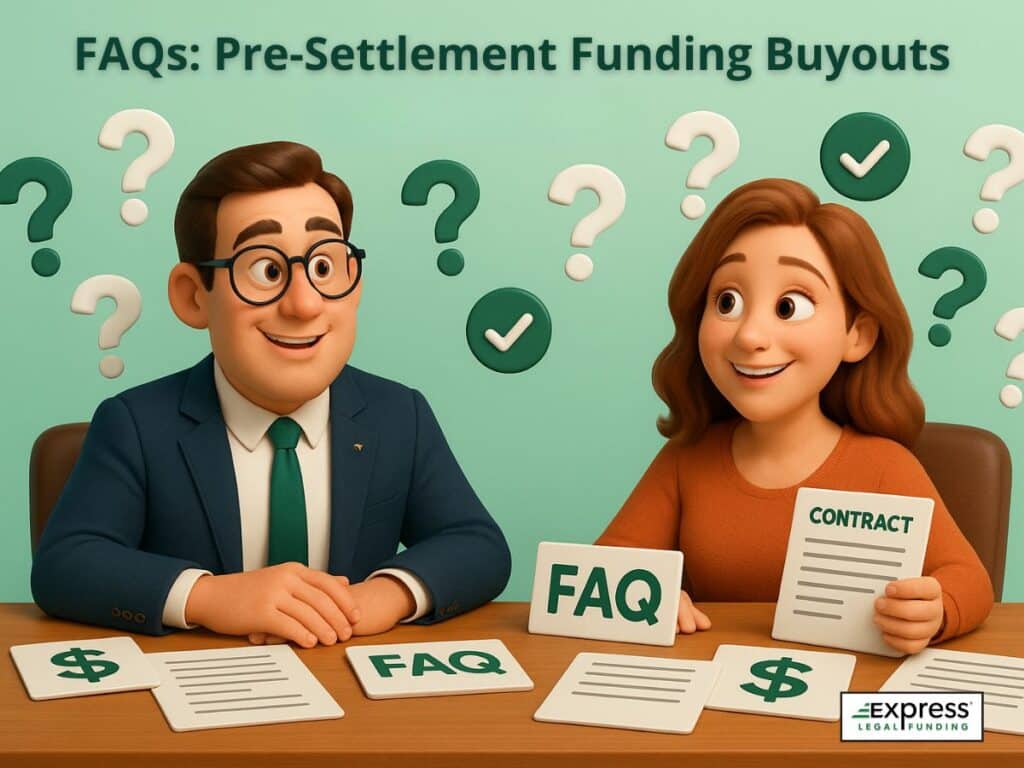
If you’re thinking about a buyout for your pre-settlement funding, you probably have a few questions. Here are clear answers to the questions plaintiffs ask most often.
Will I always get more money with a pre-settlement funding buyout?
Yes. A buyout includes additional funds beyond paying off your old advance. The new funding company clears your current lien and issues a new contract that gives you extra cash upfront. The exact amount depends on your case value and how much funding you have already received.
What is a payoff letter for pre-settlement funding?
A payoff letter is a document your current legal funding company sends that shows exactly how much you owe on your existing advance. It includes the principal, accrued fees, and any charges due. The new funding company uses this letter to pay off the old lien during a buyout, ensuring the lien is properly cleared and replaced.
Do I owe both lawsuit loan companies if I get a buyout?
No. In a buyout, the new lawsuit loan company pays off your old funder directly. This clears the previous lien, so only one lien remains on your case. Your attorney confirms the lien transfer, making sure you never owe money to two funding companies at the same time.
Does a pre-settlement funding buyout cost money upfront?
No. Plaintiffs never pay out-of-pocket for a buyout. The new funding company handles the payoff to your old funder, and any costs are built into the new contract. This allows you to refinance your advance and receive additional funds without worrying about upfront fees or surprise charges.
Are pre-settlement funding buyouts allowed in every state?
Not always. Some states limit or ban lawsuit loan buyouts. For example, in Illinois, buyouts are not allowed if the balance owed is over $100,000. Whether a plaintiff qualifies depends on state laws, the case details, and attorney cooperation. Express Legal Funding can review your situation and confirm if a buyout is allowed where you live.
How long does a pre-settlement funding buyout take?
Most buyouts finish in just a few days after approval. The new funder gets a payoff letter, completes underwriting, and issues a contract. They then pay off the old lien and send you the additional funds. Timing depends on how quickly your old funder and attorney provide the required documents.
Can my attorney refuse a pre-settlement funding buyout?
Yes. Every buyout requires your attorney’s approval. Your lawyer must agree to the lien transfer and confirm how settlement money will be distributed. If your attorney feels the buyout is not in your best interest, they can refuse to sign. Reputable companies like Express Legal Funding work closely with attorneys to make sure terms are fair.
Relevant read: Can My Lawyer Stop Me From Getting Pre-settlement Funding?
What is the collateral in a pre-settlement funding buyout?
Your future settlement is the collateral in a pre-settlement funding buyout. Unlike loans backed by cars or houses, legal funding is non-recourse, which means you only repay if you win or settle your case. If you lose, you owe nothing and keep your personal assets protected.
Does Express Legal Funding buy out pre-settlement funding contracts?
Yes. Express Legal Funding funds many pre-settlement buyouts, completing dozens every month. We pay off your old advance, clear the lien, and provide a new contract with extra funds upfront — making repayment simpler and often more affordable.
Take the Next Step With Express Legal Funding
If your current settlement advance is too costly or your funder won’t give you more money, a pre-settlement funding buyout may be the answer. At Express Legal Funding, we help plaintiffs refinance with clear terms, lower costs, and additional funds to cover everyday expenses.
We work directly with your attorney to make the process quick and stress-free. Repayment is only required if you win or settle — and with our direct funding advantage, you keep more of your settlement.
Don’t stay stuck in an expensive contract. Contact Express Legal Funding today to learn how a buyout can give you more money now and peace of mind for the future.
📞 Call us today at (888) 232-9223 or apply online to get your pre-settlement funding buyout started.
